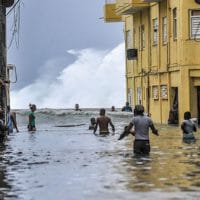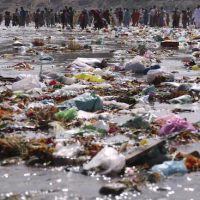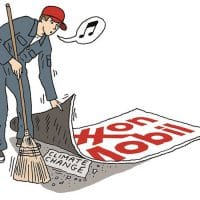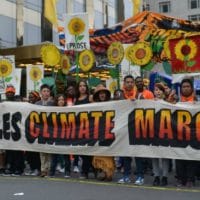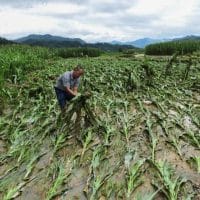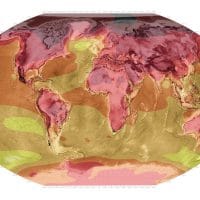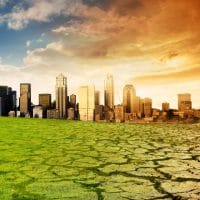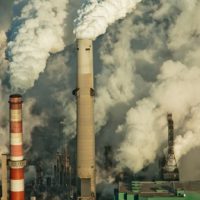-
The shitty new communist futurism
Editors’ note: This is the first in a series of ENTITLE blog articles that critically engage with the ongoing discussions about “eco-modernist socialism” and “communist futurism”, projected in Jacobin magazine’s climate change issue ‘Earth, Wind, and Fire.’
-
Cuba embarks on a 100-year plan to protect itself from climate change
On its deadly run through the Caribbean last September, Hurricane Irma lashed northern Cuba, inundating coastal settlements and scouring away vegetation. The powerful storm dealt Havana only a glancing blow; even so, 10-meter waves pummeled El Malecón, the city’s seaside promenade, and ravaged stately but decrepit buildings in the capital’s historic district. “There was great destruction,” says Dalia Salabarría Fernández, a marine biologist here at the National Center for Protected Areas (CNAP).
-
Resilience is not enough
In “The Other Side of Resilience” Renata Silberblatt and Eamon Tewell (Progressive City, October 2017) raise some important questions about the focus on resilience as a way to respond to floods, droughts, wildfires, and climate change. But they don’t go far enough. It’s not just that resilience is more complex than it seems and has multiple meanings, as they point out.
-
More than 15,000 scientists from 184 countries issue ‘warning to humanity’
“Our mandate is that we take care of Earth and earthlings and human beings because we’re all family.”
-
Imperialism is suffocating India
More than a month ago we published an article detailing some of the fallout of the ecological crisis in the Third World. The article detailed a study published by “greenpeace” that had shown figures projecting 1.2 million deaths in India every year due to air pollution-related conditions.
-
As Arkema plant burns, six things we know about petrochemical risks in the wake of Harvey
In many ways, Harvey is unprecedented. Yet, we live in a world where our president revokes policies that ensure our infrastructure is storm ready, where climate mitigation efforts have stagnated, and where disaster relief efforts often don’t reach those that need it most. We must do better.
-
Slick maneuvers
Both ExxonMobil and the Wall Street Journal have been engaged in pretty slick maneuvers in order to protect their profits by failing to publish any opinions critical of ExxonMobil.
-
The root of the climate crisis is capitalism, not demographics
Growing concerns about climate change and other environmental trends have set off the next round of old Malthusian diagnoses, raising the specter of overpopulation. In this context, it bears repeating that under capitalism the “population problem” is about ideological and social control and has nothing to do with demographics or ecology.
-
Talking about a revolution
The conflict between the needs of the majority and the interests of the few runs throughout our economy.
-
Neoliberalism has conned us into fighting climate change as individuals
While we busy ourselves with creating a more green and climate friendly lifestyle, an astonishing 100 companies are responsible for producing 71 percent of carbon emissions. The freedom of these corporations to pollute – and the fixation on a feeble lifestyle response – is no accident. It is the result of an ideological war, waged over the last forty years, against the possibility of collective action.
-
Maize, rice, wheat: alarm at rising climate risk to vital crops
No one likes to think about how extreme weather events could devastate food production which could cause global panic and disaster. However, scientists, led by Chris Kent, of the Met Office, focused their initial efforts on how extreme weather would affect maize, one of the world’s most widely grown crops. Along with maize other staple crops could be affected including those of rice, wheat and soya beans.
-
This atlas maps the end of the world
Today, “we’re cognizant of the fact that there is no future unless there is an ecological future.” That’s a reality one comes to see clearly after clicking through the digital pages of the “Atlas for the End of the World.”
-
Did that New York magazine climate story freak you out? Good.
David Wallace-Wells has a cover story on climate change in New York magazine that has kicked up quite a discussion. It’s about worst-case scenarios…[and] the dystopian future the piece describes is much worse, and forecast to happen much sooner, than most people.… I won’t rehearse the parade of horribles.… Instead, I want to address some of the critical reaction to the piece, which I have found … irksome.
-
We won’t always have Paris
Donald Trump today sentenced Planet Earth to death. Whether he has the power actually to have that sentence carried out is open to serious question.
-
Anything wrong with eco-socialism?
Political feasibility becomes irrelevant when science teaches us that this is the course human society must follow if we are to survive.
-
The Steps to Ecosocialism
John Bellamy Foster and Ian Angus reply to a recent article published by Daniel Tanuro on carbon pricing schemes. Tanuro, a vehement critic of such schemes, focuses his critique on the cautiously critical support given by Foster and Angus to proposals developed by climate scientist James Hansen.
-
The Rift in the Metabolism of Nature and Society
The truth is that the environmental problems and the mounting catastrophes facing humanity have everything to do with economic and environmental injustice and a society that put the accumulation of capital before people and the planet. This is so much the case that we will increasingly see the development of an environmental proletariat where the working class broadly speaking, accounting for the greater part of humanity, will be increasingly drawn together by the need to respond to deteriorating material conditions in which the distinction between say the material conditions on the job and life conditions in general will more and more dissolve.
-
The Mad Activist Refrains from Assassinating Donald Trump
Time to vote for our next president! Time to choose just the right person to lead our world’s most militarily advanced superpower. That’s why presidential elections should be nonviolent and fulfilling on a deep personal level! O whom, shall I choose? Let’s see. . . Hillary Rodham Clinton: Democrat and fellow feminist. Speechifies against poverty, […]
-
Climate Change and the Summit Smokescreen
Ian Angus is editor of the ecosocialist journal Climate & Capitalism. He is co-author, with Simon Butler, of Too Many People? Population, Immigration and the Environmental Crisis (Haymarket, 2011), and editor of the anthology The Global Fight for Climate Justice (Fernwood, 2010). He talked to Phil Gasper about what to expect from the Paris summit […]
-
Emily: Edited 4 the Revolution
Who says us white leftists have no feeling for High Art? Hundreds of thousands of capitalist imperialist museum-going, opera-loving, overly literate fuck-faces, that’s who. To smash this top-down bourgeois conspiracy, I am taking a couple of months off from writing this column to start a highly classy — yet class-conscious — literary journal, to be […]


